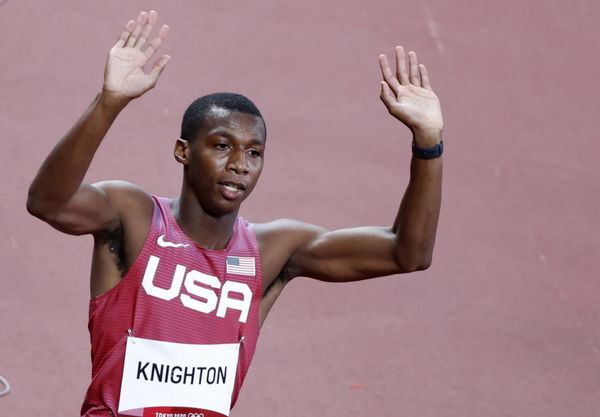
via Reuters
Tokyo 2020 Olympics – Athletics – Men’s 200m – Semifinal – Olympic Stadium, Tokyo, Japan – August 3, 2021. Erriyon Knighton of the United States reacts after crossing the line to finish first in Heat 1 REUTERS/Phil Noble

via Reuters
Tokyo 2020 Olympics – Athletics – Men’s 200m – Semifinal – Olympic Stadium, Tokyo, Japan – August 3, 2021. Erriyon Knighton of the United States reacts after crossing the line to finish first in Heat 1 REUTERS/Phil Noble
Ahead of the 2024 U.S. Olympic Team Trials, the track and field world is buzzing with drama surrounding 20-year-old Erriyon Knighton. In March, Knighton tested positive for a banned substance during a routine drug test. However, Knighton claimed that the positive test result was due to eating contaminated meat, not intentional drug use. On Wednesday, the U.S. Anti-Doping Agency announced that an arbitrator found the positive result was likely caused by contaminated meat, clearing the 200-meter world silver medalist to compete at the U.S. Olympic trials starting on June 21 to 30 at Hayward Field in Eugene, Oregon.
But there’s a twist: the World Anti-Doping Agency (WADA) said it might appeal the decision. Knighton is set to run the 200 meters at the trials in Eugene, Oregon, having only competed in one race this year at an indoor meet in February. However, despite this ruling, the track and field community is not only divided but also enraged at USADA.
In light of the recent ruling by the USADA, Track Spice, a popular account on X, stirred up the conversation by asking track and field fans for their opinions. They questioned whether it was fair that Erriyon Knighton received a no-fault violation and was not required to serve any period of ineligibility after testing positive for a metabolite of trenbolone during an out-of-competition drug test on March 26, 2024.
ADVERTISEMENT
Article continues below this ad
Do you think it’s fair that Erriyon Knighton got a no fault violation and will not be required to serve any period of ineligibility after testing positive for a metabolite of trenbolone during an out-of-competition drug test on March 26, 2024⁉️ pic.twitter.com/369bjut7Fw
— Track Spice 🌶️ (@trackspice) June 19, 2024
This query sparked a flurry of responses from the community. However, the anger was not aimed at the youngest ever individual sprint medalist in Championships history, Erriyon Knighton, but rather at the national anti-doping organization for the United States and the Athletics Integrity Unit.
Track and field fans share upset at U.S. Anti-Doping Agency’s ruling on Erriyon Knighton’s case
One fan expressed frustration with the national anti-doping organization for the United States and the Athletics Integrity Unit, sharing that the decision seemed unfair, saying, “I have no issue with the athlete cause it could be anybody. It’s @aiu_athletics and @usantidoping I am very angry 😡 at for hiding such news from the public. If this was from Africa now, they would have immediately suspended the athlete and prolong the hearing and even go to CAS.”
When 23 Chinese swimmers tested positive for a banned medication that they claimed came from contaminated supplements or medications, the World Anti-Doping Agency accepted China’s explanation and didn’t punish the swimmers. This decision sparked criticism at WADA, especially from USADA, because the positive tests weren’t initially made public.
WADA, the World Anti-Doping Agency, has argued that contamination cases originating in the United States, ranging from tainted meat to medications intended for dogs, haven’t always led to punishments. On the other hand, USADA, the U.S. Anti-Doping Agency, maintains it has consistently adhered to the rules in handling such cases. This includes publicly disclosing any violations, even when they don’t result in penalties for the athletes involved.
ADVERTISEMENT
Article continues below this ad

Another fan echoed this sentiment: “Absolutely not because it’s these out of competition tests that are most important … had it been a Letsile Tebogo baby they would’ve been sending him to the cleaners.” This points to the fact that testing for doping in sports is conducted year-round without prior notice, whether athletes are actively competing or not, to detect any enhancements gained through doping during training periods. These tests adhere to World Anti-Doping Agency (WADA) standards and are essential to maintaining an effective anti-doping program.
ADVERTISEMENT
Article continues below this ad
One fan pointed out the case of Issam Asinga, who set the Under-20 world record at 100 meters but had it stripped after testing positive for a performance-enhancer he claimed came from “recovery gummies.” The fan expressed frustration, saying, “This is absolute crap… I want to see full documentation of the investigation like Asinga.” Asinga, suspended since August 2023 for using GW1516, a substance linked to health risks, plans to appeal, though a ruling before the Paris Games seems unlikely.
Meanwhile, another fan highlighted the unfair disruptions athletes face, citing Tobi Amusan’s experience with whereabouts violations: “It’s unfair that his season was disrupted due to that. Tobi Amusan had something similar happen to her last season although that was to do with whereabouts violations—but she also wasn’t allowed to compete until it was sorted which disputed her season and her title defense.” Reflecting on this fan sentiment, what are your thoughts? Do you believe it’s fair that Erriyon Knighton received a no-fault violation? Share your thoughts in the comments below!
ADVERTISEMENT
ADVERTISEMENT
ADVERTISEMENT
ADVERTISEMENT

